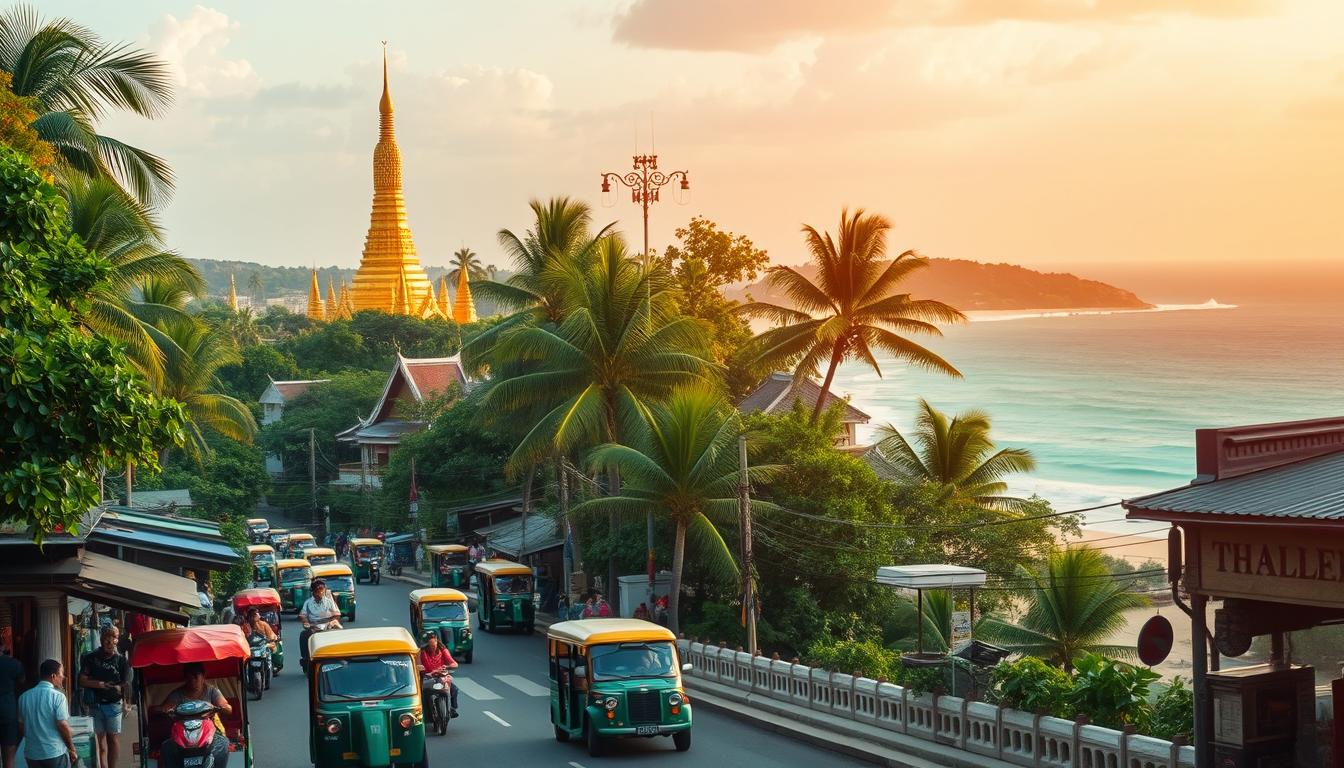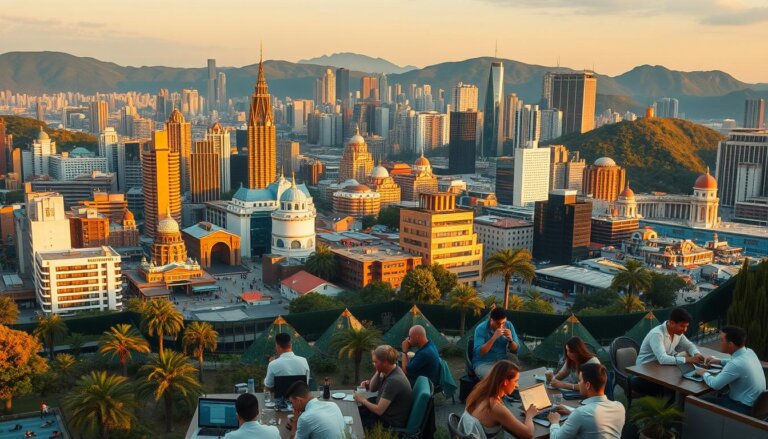Mastering Business Travel in Thailand: Essential Tips
Are you ready to explore Thailand’s vibrant culture and fast-paced business world? You might ask: How can you make a lasting impression and achieve your business goals in this Southeast Asian country?
To succeed, it’s key to research your destination and grasp the local business culture. Thailand is famous for its hospitality. Yet, it’s also a land with deep customs and traditions. Knowing these can help you stay professional while fitting in with the local business style.
Before you go, think about the travel tips that will make your trip to Thailand smooth. With the right attitude and preparation, you’re set for a successful business trip.
Understanding Thailand’s Business Landscape
Getting to know Thailand’s business world is key for international travelers. The economy thrives on manufacturing, tourism, and farming.
Key Economic Sectors and Business Hubs
Thailand’s growth comes from its strategic spot and strong industry. Manufacturing is big, with lots of cars and electronics made here.
Bangkok’s Central Business District
Bangkok is the main business spot, with many big companies and banks. The city’s Bangkok Skytrain and Suvarnabhumi Airport make getting around easy.
Emerging Business Centers in Chiang Mai and Phuket
Bangkok is still the top spot, but Chiang Mai and Phuket are growing. They’re big in tech and tourism.

Business Culture Overview
Thai business values respect and hierarchy a lot. Knowing these customs is key for good business talks.
Hierarchy and Respect in Thai Business
In Thai business, hierarchy and respect are everything. Swapping business cards shows respect, and using formal titles is common.
The Concept of “Face” and Its Importance
The idea of “face” is very important in Thai culture. Keeping dignity and avoiding shame is crucial in business talks.
Pre-Trip Planning and Research
Before you head to Thailand for business, it’s key to plan well. This ensures your trip is smooth and productive. You’ll need to tackle several important steps to navigate Thailand’s business world.
Essential Documents and Visa Requirements
Getting the right visa is a must. Thailand has many visa types, each with its own rules and needed documents.
Business Visa Types and Application Process
Business travelers can choose from specific visas for different activities. You’ll need to apply at a Thai embassy or consulate.
Required Supporting Documentation
For a Thai business visa, you might need a letter from a Thai company, proof of your business, and financial statements.
| Document Type | Description | Required for |
|---|---|---|
| Letter of Invitation | Official letter from a Thai company inviting you for business purposes | Business Visa |
| Proof of Business Registration | Documents showing your company’s legal registration | Business Visa |
| Financial Statements | Bank statements or financial reports demonstrating financial stability | Business Visa, other visa types |
Understanding Thai Business Calendar and Holidays
Thailand has many public holidays that can affect business. Knowing these holidays is vital for planning your visits.
Major Thai Holidays to Consider
Big holidays include the Thai New Year (Songkran) and the King’s Birthday. During these times, many businesses may close or work shorter hours.
Optimal Timing for Business Visits
Planning your trip around these holidays can help avoid disruptions to your business meetings and activities.
Weather Considerations for Different Regions
Thailand’s weather changes by region, with a tropical climate in most areas. Knowing the weather helps you pack right and plan your trip.
Monsoon Season Impact on Business Travel
The monsoon season can hit different parts of Thailand at different times, affecting travel plans.
Packing Appropriately for Thailand’s Climate
Packing light, breathable clothes and being ready for rain can make your trip more comfortable.
Tips for Successful Business Travel to Thailand
To have a successful business trip to Thailand, being well-prepared is key. Knowing the local business culture and customs can greatly improve your experience and results.
Setting Clear Objectives for Your Trip
Before you go, decide what you want to achieve. This means:
- Prioritizing Meetings and Engagements: Pick the most critical meetings and plan them first.
- Establishing Realistic Goals: Know what you can do during your trip to avoid too much.
Creating a Flexible Itinerary
A flexible schedule helps you adjust to any surprises or changes. Think about:
- Building Buffer Time Between Appointments: Make sure you have time for travel and unexpected delays.
- Adapting to Last-Minute Changes: Stay calm and have a plan B if things change or meetings get cancelled.
Preparing for Meetings and Presentations
Good preparation is essential for meetings and presentations. This includes:
- Cultural Adaptations for Presentations: Learn about Thai business culture to make your presentations better.
- Translation and Interpretation Needs: Think about getting a translator or interpreter if there’s a language issue.
By following these tips, you can make your business trip to Thailand productive and successful. You’ll stay professional while fitting in with local customs.
Navigating Transportation in Thailand
Traveling in Thailand is easier when you know how to get around. As a business traveler, knowing your options can make your trip a success.
Airport Transfers and Getting Around Bangkok
Bangkok’s public transport is great for getting around. For airport transfers, you have many choices.
Airport Rail Link and BTS Skytrain Options
The Airport Rail Link connects Suvarnabhumi Airport to the city center. The BTS Skytrain covers major business areas. These services save time and reduce stress.
Executive Car Services and Limousines
Hiring an executive car or limousine offers a personal touch. It’s comfortable and makes a good first impression.
Intercity Travel Options
Thailand has a good network for traveling between cities. There are many ways to travel, depending on your budget and needs.
Domestic Flights and Airlines
Domestic flights are great for longer trips. Thai Airways, Bangkok Airways, and Nok Air offer many flights between cities.
High-Speed Rail and Bus Services
The high-speed rail connects cities like Bangkok and Chiang Mai. Bus services, including VIP buses, are cheaper but still reliable.
Using Ride-Hailing Apps and Taxis
Ride-hailing apps and taxis are everywhere in Thailand. They’re easy to use for city travel.
Grab and Other Local Services
Grab is a popular app in Thailand. It offers services from basic to luxury. It’s safe and convenient for business travelers.
Negotiating with Traditional Taxis
Always negotiate the fare with traditional taxis or use the meter. Agree on the fare before you start.
Knowing how to use transportation in Thailand makes your business trip easier. Stay safe, be aware of your surroundings, and plan ahead. These bangkok business travel tips will help you have a productive and stress-free trip.
Accommodation Strategies for Business Travelers
Choosing the right place to stay in Thailand can greatly affect your business travel. There are many options, from luxury hotels to unique stays. It’s key to pick a place that fits your business needs.
Business-Friendly Hotels and Locations
Thailand is home to many international hotel chains. They offer business centers and are close to major business areas. International Hotel Chains with Business Centers have what you need, like meeting rooms and fast internet.
International Hotel Chains with Business Centers
Hotels like the Marriott and Hilton have everything you need. They make sure you stay connected and productive.
Strategic Locations Near Business Districts
Staying in hotels near business centers, like Bangkok’s Sukhumvit area, saves time. It also boosts your productivity.
Alternative Accommodation Options
For longer stays or a more flexible stay, think about Serviced Apartments for Extended Stays or Co-living Spaces and Business-Oriented Airbnbs. These offer a home-like feel, with kitchens and a relaxed vibe.
Serviced Apartments for Extended Stays
Serviced apartments are perfect for long business trips. They provide a cozy, self-contained space.
Co-living spaces and business-oriented Airbnbs mix community with convenience. They often have coworking areas and chances to network.
Communication and Technology Essentials
To succeed in Thailand’s business world, you must stay connected. The right technology and communication strategies are crucial. They help build strong business relationships and meet your goals.
Mobile Connectivity and SIM Cards
Being connected on the move is essential for business travelers. A local SIM card is a cost-effective choice. It allows for data and voice calls, keeping you in touch with others.
Best Providers for Business Travelers
Thailand offers several mobile network providers for business travelers. AIS, True Move, and DTAC are top choices. They have plans with data packages perfect for international business use.
International Roaming vs. Local SIMs
International roaming is convenient but pricey. A local SIM card can save money on data and calls. Make sure your phone is unlocked and works with Thai networks.
Internet Access and VPN Considerations
Secure internet access is key for business. Use a Virtual Private Network (VPN) when on public Wi-Fi. It boosts data security and protects your privacy.
Reliable Wi-Fi Hotspots and Co-working Spaces
Thailand has many places with reliable Wi-Fi. Look for co-working spaces that offer internet and a professional environment. They help you stay productive.
Data Security and Privacy Measures
Data protection is critical. Use strong passwords and keep devices updated. Be careful when accessing sensitive info over public networks.
Focus on your communication and technology needs for a successful trip to Thailand. This ensures professionalism and success.
Thai Business Etiquette and Cultural Awareness
Traveling to Thailand for business means learning local etiquette and cultural nuances. These can greatly impact your professional interactions.
Greeting Protocols and Business Card Exchange
In Thailand, greeting is a big deal. The “wai” is a key gesture of respect. You place your palms together at chest level and bow slightly.
The Wai and Proper Handshake Etiquette
The wai is a traditional Thai greeting. When meeting Thai business partners, a wai followed by a handshake is polite. However, handshakes should be gentle, as firm ones are not customary.
Business Card Presentation and Receiving
When exchanging business cards, use both hands. Take a moment to examine the card you receive. This shows respect for the person and their title.
Meeting Conduct and Negotiation Styles
Understanding Thai business meetings is key. Thais value harmony and avoid confrontation.
Indirect Communication Patterns
Thai communication is indirect. They prefer avoiding direct refusals or negative responses. Pay attention to non-verbal cues and body language.
Decision-Making Processes in Thai Companies
Decision-making in Thai businesses is slow. It involves consensus-building. Patience and building relationships are crucial for successful negotiations.
Gift-Giving Customs and Taboos
Gift-giving is a big custom in Thai business culture. It shows respect and appreciation.
Appropriate Business Gifts
Consider gifting high-quality items that reflect your company’s brand or products. Avoid gifts that seem too personal or extravagant.
Cultural Sensitivities to Avoid
Be careful of cultural taboos. Avoid touching someone’s head or pointing with your feet. These actions are considered rude.
| Cultural Aspect | Thai Custom | Business Implication |
|---|---|---|
| Greeting | Wai (palms together, bow) | Signifies respect |
| Business Card Exchange | Use both hands, examine card | Shows respect for the person and title |
| Communication | Indirect, non-verbal cues | Avoids confrontation, builds harmony |
Maintaining Professionalism While Adapting to Local Customs
Traveling to Thailand for business means finding a balance. You need to keep your professional image while also adapting to local customs. This balance is key to making a good impression and achieving your goals.
Appropriate Business Attire
Your clothes play a big role in showing professionalism in Thailand’s business world. Formal business attire is recommended for important meetings and presentations.
Formal Dress Codes in Thai Business Settings
In Thai business settings, you should wear conservative and modest clothing. Men should wear a suit and tie. Women should wear a professional dress or pantsuit.
Adapting to Climate While Remaining Professional
Thailand’s tropical climate can be tough. Choose lightweight, breathable fabrics to stay cool while looking professional.
Punctuality and Time Management
Punctuality is very important in Thai business culture. It’s crucial to understand the local time concept and manage your time well.
Thai Time Concept vs. Western Expectations
Thais value punctuality but have a different time concept than Western cultures. Be ready for possible delays.
Setting Clear Deadlines and Follow-ups
To avoid delays, set clear deadlines and follow up with your Thai counterparts. This helps keep your business objectives on track.
Balancing Western and Thai Business Practices
Finding a balance between Western and Thai business practices is key for successful interactions.
| Aspect | Western Approach | Thai Approach |
|---|---|---|
| Communication Style | Direct and Assertive | Indirect and Polite |
| Decision Making | Quick and Decisive | Consensus-driven and Deliberate |
| Business Relationships | Professional and Formal | Personal and Respectful |
Finding Common Ground in Business Approaches
Be ready to adapt your approach to find common ground with your Thai counterparts.
Showing Respect While Maintaining Efficiency
Respecting Thai customs and practices helps build trust and rapport. This leads to more efficient business dealings.
Networking Opportunities and Building Relationships
As you explore Thailand’s business world, you’ll find many chances to network. Building strong relationships is key for success in business travel.
Industry Events and Business Associations
Going to industry events and conferences is a great way to meet people. Thailand has many events that draw in business pros from around the world.
Chambers of Commerce and Networking Groups
Joining chambers of commerce and networking groups can help you make connections. These groups often have events and can introduce you to others.
Trade Shows and Industry Conferences
Being part of trade shows and industry conferences is very helpful. These events are great for meeting potential partners and clients.
After-Hours Business Socializing
After-work socializing is a big part of Thai business culture. Knowing the rules for business dinners and what to talk about can help you network better.
Business Dinners and Protocol
Business dinners in Thailand follow certain rules. Knowing these customs can make a good impression.
Appropriate Topics for Social Conversation
Talking about business, culture, and interests is a good start. But, it’s best to steer clear of sensitive topics.
Leveraging Local Contacts and Interpreters
Using local contacts and interpreters can really boost your networking. They can share insights on local business and help with communication.
Finding Reliable Local Partners
Finding trustworthy local partners is important. They can help you understand the business scene and make connections.
Working Effectively with Translators
When using translators, make sure communication is clear. Telling them your goals can lead to better results.
Health and Safety Considerations
When planning your business trip to Thailand, think about health and safety. This will help you have a smooth and successful trip.
Travel Insurance and Healthcare Access
It’s key to have travel insurance for medical emergencies. Thailand’s healthcare system is good, with many international hospitals and facilities.
International Hospitals and Medical Facilities
Bangkok and Chiang Mai have top hospitals for international patients. They offer quality medical care.
Emergency Medical Services
For emergencies, call 1669 or 191 for an ambulance. Many hospitals have staff who speak English.
Food Safety and Dietary Considerations
Thai food is famous, but remember food safety. This helps avoid health problems during your trip.
Safe Dining Options for Business Travelers
Choose restaurants locals and travelers like. Stay away from raw or undercooked foods.
Managing Food Allergies and Restrictions
If you have special dietary needs, learn Thai phrases. This helps you communicate your needs.
Personal Security and Emergency Contacts
Stay safe in Thailand by knowing your surroundings. Be careful, especially at night.
Safe Transportation and Movement After Dark
Use trusted taxi services or apps. Always check the driver’s ID.
Embassy Services and Emergency Resources
Register with your embassy or consulate. This way, you get safety and security updates.
| Emergency Service | Contact Number | Notes |
|---|---|---|
| Ambulance | 1669 | Available 24/7 |
| Police | 191 | For emergencies only |
| Tourist Police | 1155 | For issues related to tourists |
Conclusion: Making Your Thai Business Trip a Success
As you get ready for your business trip to Thailand, remember that success comes from being prepared, understanding the culture, and being flexible. Knowing Thailand’s business scene, planning well, and respecting cultural differences will help you succeed. This way, you can handle the challenges of doing business in this lively economy.
From getting around to picking the best place to stay, and from knowing Thai business manners to using networking chances, this guide has got you covered. Whether you’re at industry events or socializing, being ready will make your trip both productive and fulfilling.
By using this Thailand travel guide, you’ll be ready for the ups and downs of business travel in Thailand. You’ll build strong connections and reach your business goals. With the right attitude and planning, your trip to Thailand can be a huge success. It will open doors to more chances in this exciting market.
FAQ
What are the essential documents required for a business trip to Thailand?
For a business trip to Thailand, you’ll need a valid passport and a business visa. You’ll also need a letter of invitation from a Thai company. Additionally, proof of employment and financial statements are required.
How do I navigate transportation in Bangkok?
Bangkok’s public transport is vast, with BTS Skytrain, Airport Rail Link, and buses. You can also use Grab or hire an executive car service for ease.
What is the best way to stay connected with clients and colleagues while in Thailand?
To stay connected, get a local SIM card or a portable Wi-Fi hotspot. Many hotels and co-working spaces also offer good internet.
What are some key cultural considerations for business meetings in Thailand?
In Thai business culture, respect and hierarchy are key. Greet colleagues with a “wai,” exchange business cards, and start with polite conversation before business.
How can I ensure my safety while traveling in Thailand?
Stay safe by being aware of your surroundings and keeping valuables secure. Avoid solo travel at night. Register with your government’s travel advisory and stay updated on local conditions.
What are some tips for successful business travel to Thailand?
For a successful trip, research your destination and understand the local business culture. Plan your itinerary well. Be flexible and consider a local guide or interpreter for meetings.
What type of accommodation is best for business travelers in Thailand?
Choose hotels with international brands and business centers. For longer stays, consider serviced apartments or co-living spaces for a local feel.
How can I manage my health and well-being while traveling in Thailand?
Stay healthy by drinking bottled water and eating at safe restaurants. Consider travel insurance for medical emergencies. Be aware of local health issues and take precautions.







